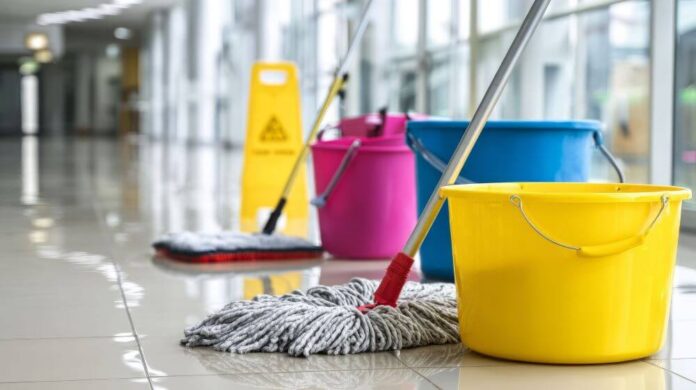Maintaining a clean and hygienic workplace is essential for productivity and employee morale. However, many businesses unknowingly overspend on janitorial services without receiving commensurate value. Identifying warning signs of overpayment can help your organization optimize its cleaning budgets while ensuring high standards.
Below are ten key indicators that your company may be paying too much for its cleaning services:
1. Inflexible Contract Terms
A rigid janitorial contract locks businesses into fixed terms, regardless of operational changes. If your company reduces its office size but pays unchanged fees, it wastes money on unused services. Flexible contracts, however, can adapt to fluctuating needs, such as varying square footage or staffing shifts, ensuring costs align with actual usage. This scalability can help prevent overpayment and enhance budget efficiency, making dynamic agreements a smarter financial choice for your growing or evolving business.
Because of this, working with reputable providers, such as a Dallas cleaning service or similar locations, would be a great start. These providers typically provide clear, itemized contract terms that break down costs for labor, supplies, and additional tasks.
2. Subpar Cleaning Quality Despite High Costs
High-cost janitorial services should translate to impeccable cleanliness, yet recurring problems like lingering dust, neglected restrooms, or streaked floors suggest subpar performance. When paying premium rates, your business deserves meticulous attention to detail and reliable results.
Persistent cleaning shortcomings can indicate insufficient staffing, poor management, or corner-cutting, all signs of an underperforming vendor. Consistent quality should also be non-negotiable, as even minor lapses can harm workplace safety and hygiene and professional impressions.
3. Excessive Supply Charges
Many janitorial services bundle cleaning supplies into contracts at heavily marked-up rates, unnecessarily driving up costs. Your business should audit itemized invoices to compare material charges against retail prices, sometimes procuring supplies independently yields significant savings. Ethical cleaning companies can provide transparent pricing breakdowns, separating labor from supply expenses.
If markup percentages seem excessive, negotiating supply costs or switching to a BYOS (bring your own supplies) model can significantly lower monthly service fees without sacrificing cleanliness standards.
4. Unnecessary Add-On Services
Many janitorial providers push unnecessary add-ons like weekly carpet cleaning or excessive window washing to inflate invoices. While periodic deep cleaning has value, scheduling premium services too frequently without clear need, wastes resources. Your business should audit service frequency against actual facility requirements.
A cost-effective approach prioritizes routine maintenance while reserving specialized treatments for seasonal or as-needed scenarios, ensuring budgets aren’t drained by services that don’t meaningfully impact daily cleanliness standards.
5. High Employee Turnover Affecting Service Consistency
High janitorial staff turnover typically reflects poor contractor management, whether through inadequate pay, excessive workloads, or insufficient training. This instability can manifest in skipped tasks, uneven cleaning standards, and unfamiliar workers struggling with facility layouts.
Consistent underperformance can suggest that the vendor prioritizes low operational costs over service quality. Your business should question why cleaners don’t remain assigned to their account, as reliable providers retain trained teams who understand a facility’s specific needs and expectations.
6. Lack of Customized Cleaning Plans
A generic janitorial plan forces your business to subsidize unnecessary services like daily trash removal for offices that only need it weekly, or excessive floor care for low-traffic areas. Smart providers can conduct facility assessments to design customized schedules matching usage patterns. This precision can eliminate redundant tasks, focusing on labor hours where they’re truly needed. This can result in lower costs without compromising hygiene, as budgets align precisely with a facility’s operational realities and cleanliness priorities.
7. Hidden Fees and Unexpected Charges
Hidden charges like emergency call-out fees or vague “administrative costs” can inflate cleaning bills annually. Reputable contractors can provide detailed service agreements specifying all possible extras, like after-hours of work, biohazard cleanup, or supply surcharges, with clear pricing structures.
Your business should demand complete fee transparency before signing; any contract allowing undefined add-ons can invite budget exploitation. Proper documentation can help prevent vendors from arbitrarily tacking on charges for routine service expectations.
8. Poor Communication and Unresponsiveness
Slow response times to service issues reveal a vendor’s misplaced priorities, such as collecting payments rather than maintaining standards. Quality providers can implement responsive protocols, such as 24-hour complaint hotlines, digital work order systems, and guaranteed correction timelines.
When recurring problems like missed cleanings or supply shortages go unaddressed for days, it can signal systemic disorganization. Your business paying premium rates deserves prioritized communication, with escalations directly to management when frontline staff fail to resolve deficiencies promptly and professionally.
9. Outdated Cleaning Methods
Outdated cleaning methods like manual mopping instead of auto-scrubbing or chemical sprays versus microfiber systems waste time and drive-up labor hours. Forward-thinking janitorial providers can invest in high-efficiency equipment (HEPA vacuums, electrostatic sprayers) and evidence-based workflows like zone cleaning. These advancements can complete tasks faster while improving results. Your business should verify your vendor’s technology adoption, as stagnant operators pass their inefficiency costs directly to clients through bloated service fees.
10. No Performance Guarantees
Reputable janitorial firms typically offer service-level agreements with performance clauses, like complimentary re-cleaning for missed areas or discount provisions for consistent failures. Contracts lacking these safeguards allow subpar work without recourse. Your business should require written quality guarantees specifying response times for deficiencies. Providers refusing such terms can typically operate without proper quality control measures, transferring all risk to the client while collecting full payment regardless of service delivery outcomes.
Final Thoughts
Regularly reviewing contracts, comparing market rates, and negotiating terms can help businesses avoid spending. Seeking transparent, customized solutions can also ensure optimal value without sacrificing cleanliness. By recognizing these signs, your organization can make informed decisions and secure cost-effective janitorial services that meet your needs.
